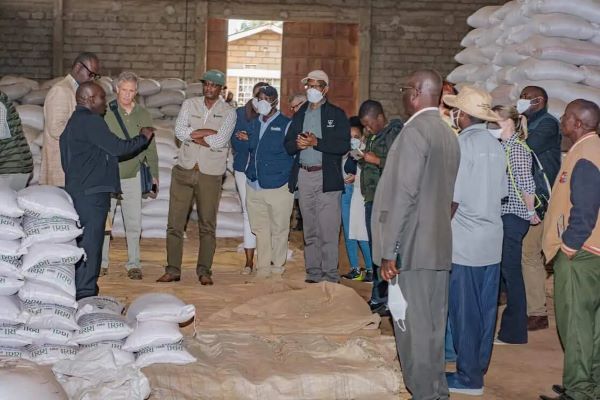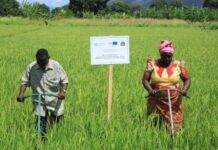By Zablon Oyugi
The Eastern Africa Farmers Federation (EAFF) has deployed a digital platform in a bid to help smallholder farmers mitigate challenges such as access to finance and quality inputs, climate change, lack of proper storage facilities, and market access.
According to EAFF Board Member Mr. Philip Kiriro, the farmer services platform called e-granary is meant to improve the living standards of smallholder farmers in Kenya through increased incomes and financial inclusion.
In this, farmers are organised into cooperatives or business clusters to manage the value chains and the products they deal with.
“Our approach is slightly different because we have said, as small farmers, if you look at the markets, markets have owners, even the markets in our countries, in our capitals that are agricultural markets, they have owners, it’s very difficult for farmers to get onto that market and do business,” he said, adding, “So we said, why don’t we establish our business line through value chains, by organising ourselves and agreeing that we need to collectively make sure that we dominate one important segment of agri-food business and that is aggregation.”
This has been advantageous to farmers, who have also received support from the private sector. For example, partnering with off-takers has ensured the farmers’ produce has a ready market.
How e-granary works
In order to utilize the platform, farmers are required to complete a registration process using their phone numbers, which serve as both their contact information and mobile wallets.
Once farmers deliver their produce to warehouses, they receive payment on credit at a rate of 100 percent, assuming a low-grade quality for the grains. The grains are evaluated and each batch is tagged for traceability. Subsequently, any revised grade is communicated back to the farmers.
Following the harvest, prices experience an increase, and the extension of credit to farmers is determined based on factors such as the expected price surge, the new grade of their produce, and their credit score.
E-granary manages the sale of the grains to output traders and, after deducting outstanding loans, interest charges, and warehouse fees, disburses the remaining amount to the farmers.
Support from suppliers
Farmers have also gained support from suppliers of farm inputs, where the lobby and specific groups agree on the method used to supply fertilisers and seeds to save money, ensure quality input and see to it that the products reach the farms on time.
E-granary has also assisted farmers in accessing finance through tailor-made products and addressed risks that farmers face by having discussions with insurance companies.
“For example, Vision Fund has microfinance, and we worked with them in Kenya. It got to a point where they started reducing the interest specifically for farmers out of the money they give out because they saw the larger benefits that emanate from us aggregating farmers. They can support farmers in borrowing for other activities like value addition, apart from just borrowing for crop production,” said Mr. Kiriro.
Goodwill from the government is also crucial in any sector, and e-granary has allowed farmers to get government support for their projects.
“In the case of Kenya, we have gone to counties like Nakuru. We have been to counties in Western and Eastern Kenya to discuss how we can partner with county governments, now that agriculture is devolved to ensure that we energise agribusiness,” said Kiriro.
With support from AGRA’s Financial Inclusion for Smallholder Farmers in Africa (FISFAP) programme, the e-granary worked with farmers in Meru cooperatives, Nakuru, Trans Nzoia, Bomet, and Narok.








